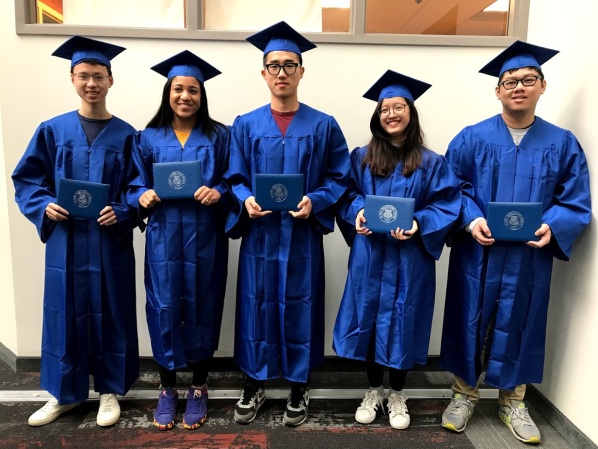 By current SPP student Valeria from Venezuela
By current SPP student Valeria from Venezuela
Since 8th grade, I’ve been looking forward to graduation day; to finally step out of school and enter college; to study things I care about, and to surpass the limitations I was given in my previous schools. However, in senior year I felt different.
“You’re too immature, Valeria. Too immature, too young, and too dependent on your parents for you to leave to college,” a little voice whispered inside my head.
During the first two months of my stay in St. Paul, I was struck with the realization I was not prepared to enter this new phase of my life. It all started at the beginning of the first semester last fall. The story goes a little something like this:
I was clueless as to what university I wanted to go to, nostalgic of my family and culture, out of my elements in class, dispirited in my only A.P course, and consumed by preoccupation over standardized testing for colleges. The weight of my responsibilities kept sinking me to the bottom as I drowned on my own. I had never struggled in my life without having someone to make it better, as I grew up in a collectivist culture. For quite a while, I thought that I had lost that here, until one day as I sat alone studying for the SAT, one of my teachers took the initiative to help me out a little. Every day that I sat down with him, I sighed of relief; his sincere willingness to help me without receiving anything in return was heart-warming. His advice not only brought tranquility to my soul, but gave me strength to stay persistent. I was no longer alone.
In addition, later on Vicky came into my life. I had gone to our school counselor Ms. Hill several times, however what I wanted her to do for me would have required the use of too much of her time, considering that she had to guide 63 other seniors (some that might be even more lost than me in such a labyrinth).
Ms. Hill, being the consummate professional that she is, sensed I was lost at sea, and so she reined me in back to shore. She gave me a small, fairly mundane, contact card with the name “Vicky” sprawled in simple black lettering (little did I know the impact that small, mundane card would have on my college search). Vicky is a former SPP counselor and Advanced English Composition teacher who left her teaching job for a job as a lawyer; still, she spends her free time helping students in my situation.
I still had a sea of colleges to pick and choose from, and yet the question remained, where would I really fit in? Which one would have the best broadcast journalism program? Which one would have the biggest diversity of cultures? Which one this? Which one that? Which one? Vicky helped me figure all this out by making me form my own conclusions.
I had to re-start my college search, only this time with her there, over my shoulder guiding me. To be frank, I was irritated that I’d have to start the search process all over again from scratch, but looking back it was probably the best thing that I could have done. When I was on my own, I let my own bias for big name schools get in the way of what I was really looking for, and began to apply to colleges that offered a curriculum I did not even want or would not even be helpful for my desired career.
Can you imagine? Going to a college I don’t like, far away from my family and home (which was a sacrifice I guess I was willing to make) and coping with the stress of college life who knows how. I was well on my way to imploding because of how unprepared I was for college, the concept of adult independence was still new to me and I wouldn’t have an altruistic teacher to guide me anymore. Thanks to Vicky, all the self-destruction was spared.
Vicky also made me understand the one thing that kept on adding weight on my shoulders. This whole time, I had been looking for some sort of emotional shelter within my Host Family and I failed in my attempts. I told Vicky the story of how I couldn’t find emotional comfort with them, and she said, “Valeria, you cannot go to a hardware store and expect to buy raisins, you have to go to a grocery store for that. What you are looking for is something they might not be able to provide you with, because they are simply not used to it. There will be other people, like your teacher, that will make your experience unique and fascinating, leaving a mark in your heart.”
And she was right, I was looking in the wrong places. My Host Family had been great, but they were not the ones that would give me the affection and support I craved. Emotionally, the burden was off my back as I stopped making my Host Family into something they were not: my actual family or any Venezuelan. I finally understood I couldn’t force them to act like my culture does.
A month later, I was in Ashburn, Virginia spending Christmas with my family and finally finishing my college applications. All the stress was gone, but something was still aching. Was I really satisfied with my decisions?…I think I wasn’t.
I left my father’s family living in Ashburn for a few days to visit my mother’s sister in Washington D.C. Her name is Carmen Beatriz, but I always called her Aunty Triz. I hadn’t seen her in years because Venezuela’s situation forced her (along with many other relatives and friends) to leave me. We had a great time together, but the clock was ticking and it was time for me to go back to Ashburn.
As we were getting closer and closer to Ashburn, anxiety kept taking over me and when I had to say goodbye I shattered. That’s what had been bugging me this whole time. Ever since September all the way to that cold night in December, I realized I was unsatisfied because I will never be able to live in peace If I am away from the warm people I love and the culture that shaped every aspect of my personality. Although the Universities I applied to were the best options when it came to the education they would provide; wasn’t my personal happiness a huge factor to consider as well? I never thought about it because I did not think it was a thing that would bother me. I had always been a happy person, but I wasn’t in the culture that I’m from; the one that truly brings me internal peace and enamors me more each day of my existence.
That night was a massive paradox to me, I was broken and cured. It cleared my blurred vision and I realized what I’d wanted this whole time: great education near my family. What a better place for that than Colombia? The most similar country to Venezuela that offers me infinite opportunities and a near location to my precious home. Today, I see clearly what I want, and feel immensely grateful for my teacher, who will always have a place in my heart, Vicky, and my school SPP. Without them I would have made the wrong decisions and postponed my happiness and inner serenity. Moreover, SPP, its passionate staff, and my experience with them taught me how to manage my time, control stress, work hard independently, but most importantly prepare me for the next phase of my life.










 By Student Advisor Janel Cook
By Student Advisor Janel Cook


 In
In By current SPP student Valeria from Venezuela
By current SPP student Valeria from Venezuela
 When I came to America, I was like a clean slate. I both knew a lot, and I did not. I knew how to function as a person, but I didn’t know what it was like to live across the ocean from your parents. That was one of those things I had to learn the hard way. I was both afraid and excited. Luckily for me, excitement was stronger than fear. Quoting Franklin Delano Roosevelt, “the only thing we have to fear is…fear itself — nameless, unreasoning, unjustified terror which paralyzes needed efforts to convert retreat into advance.” It’s the same thing with the first days at a new school. As soon as you stop fearing the unreasonable, you advance. Your development goes forward.
When I came to America, I was like a clean slate. I both knew a lot, and I did not. I knew how to function as a person, but I didn’t know what it was like to live across the ocean from your parents. That was one of those things I had to learn the hard way. I was both afraid and excited. Luckily for me, excitement was stronger than fear. Quoting Franklin Delano Roosevelt, “the only thing we have to fear is…fear itself — nameless, unreasoning, unjustified terror which paralyzes needed efforts to convert retreat into advance.” It’s the same thing with the first days at a new school. As soon as you stop fearing the unreasonable, you advance. Your development goes forward.










